“The future of any corporation is as good as the value system of the leaders and followers in the organisation.”
~ N. R. Narayana Murthy
The largest, richest, and most diverse city on Earth, New Angeles is home to the Space Elevator that rises along its buckyweave tether and connects us to Luna and its invaluable Helium-3 deposits. It is here, in New Angeles, that you’ll find the global headquarters for the worlds’ most powerful megacorps: Haas-Bioroid, Globalsec, Jinteki, Melange Mining, NBN, and the Weyland Consortium. And it is here, in this shining beacon of human achievement and advancement, that these powerful megacorps enjoy a uniquely fertile breeding ground for their projects and their rivalries.
In New Angeles, each player takes control of one of these MegaCorps… Each one has its own player dashboard showing its colour and special ability. I played the Droid moving ‘Haas-Bioroid’ because they’re Purple 🙂
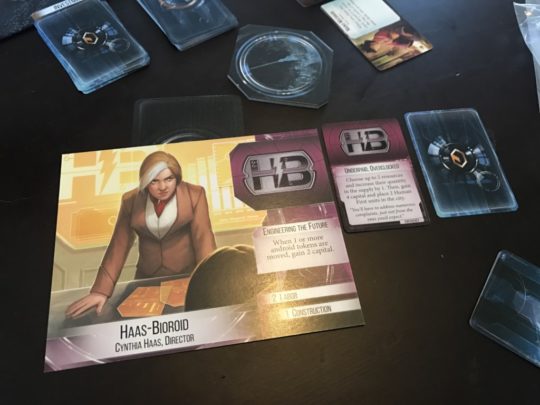
As you’re a MegaCorp you’re obviously trying to make money… However, it’s not just who makes the MOST money…
Hidden Role
Everyone gets a random, secret card with one of the other players’ MegaCorpss on it. Your goal is to have more money than that player at the end of the game. If you happen to get a card with your own MegaCorp it’s different. You then have to outscore 3 people, ANY 3 people.
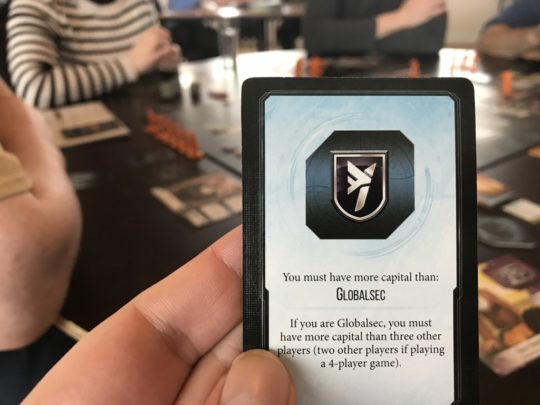
There is one other card that’s different and you win alone with that one. If the game ends early due to Threat… but more on that later.
How do you work towards your goal? Well, there are a few things…
First, there is a board of ‘New Angeles’ made up of different districts. These contain various minis and tokens, they’re not important for now.
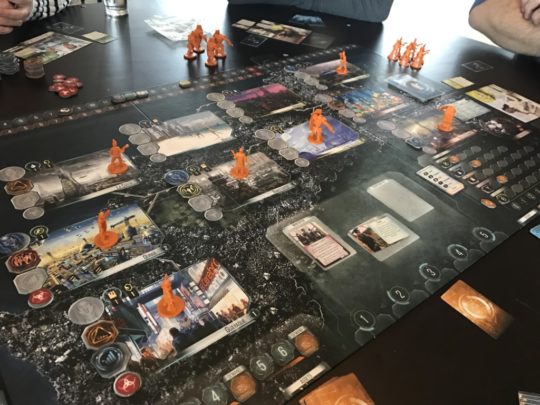
Over 6 rounds players will work together (kinda) to manipulate the board. You help those different regions produce resources to meet a specific demand. There are 6 rounds in the game and each round has 3 turns. (in a 6 player game anyway) That’s how long you have to handle this board situation.
Offers
This is done via Offers…
The start player will ‘Make an Offer’, that is, select a card from their hand to ‘Activate’ this round. Then in turn order players have a chance to play a counteroffer… (Only one counter offer can exist at a time)
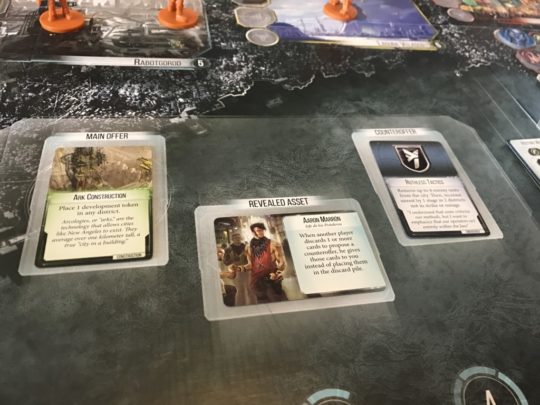
Then in turn order again, except for the players that put in the offers, the other players can add cards to either of these offers to ‘bid’ for them to get that card to activate.
You’re basically looking to get the card that’s best for the board state to go off… Or the card that will make you the most personal wealth. 😉
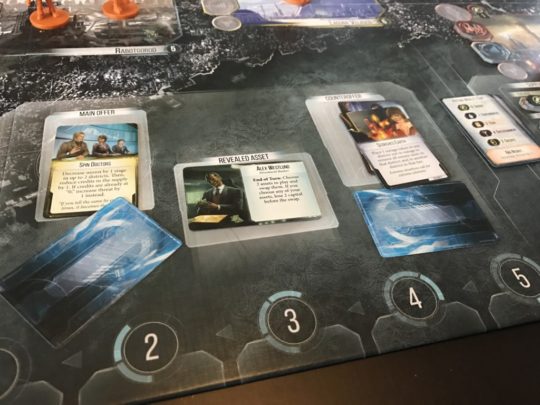
When a winner is decided, the player who put the winning card up for offer takes the ‘Asset’ card and has the final say on how the offered card activates. If that’s what they said they were going to do or not 🙂
At the beginning of a round, a demand card is visible.
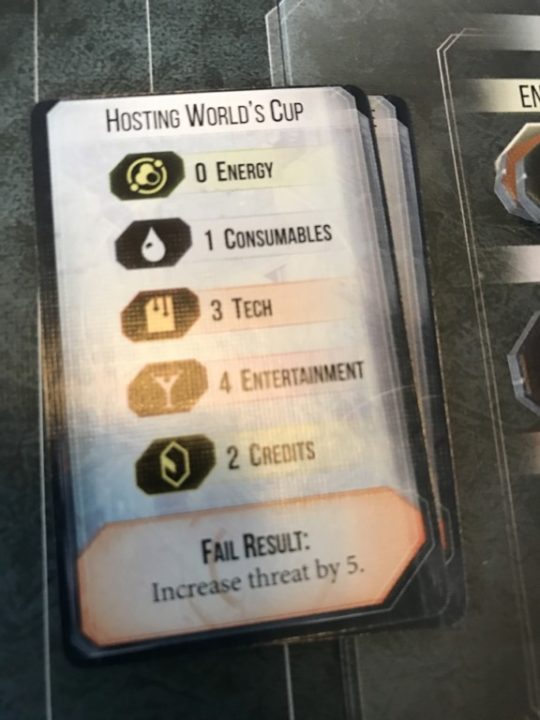
For this, you need to have that number of resources available shown on the card in a sort of scoring phase that happens after 2 rounds.
Resources
The resources you have built up during an ‘income’ phase after each round. Each area of the city with an Android token, but without certain other negative statuses, produces its resource that’s tracked on the main board.
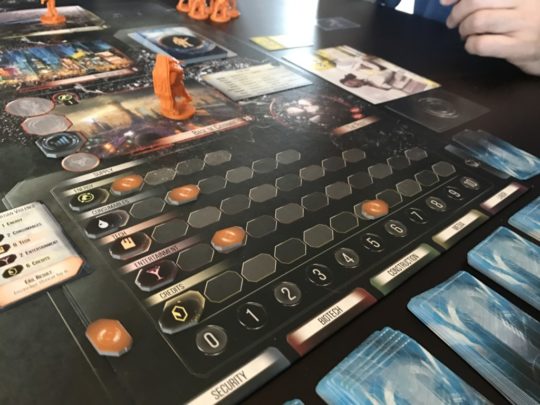
Pass and you’re good, fail and the Threat will go up. There are also Events that cause Threats to rise as well as cards players put in as offers. (There are also Event cards that do this as well as move things around the board.)
If Threat hits 25 everyone loses unless your goal was to tank the game 🙂
If you make it through to the end of the game, there will be multiple winners depending on their goal card.
New Angeles Positives
Multiple winners and differing end-game goals. It’ll be different-ish most games and you can never be sure if you’re winning unless you’re ahead of everyone on the money track. Even then, you have to make sure the Threat level doesn’t tank the game for you.
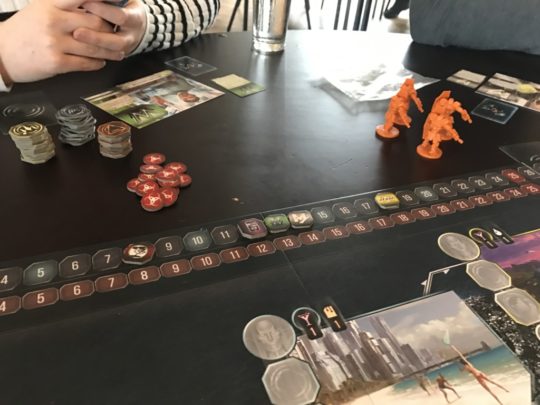
If you’re the active player, you draw 3 cards and play 1 card in your hand as the ‘Main Offer’ so you only gain 2 cards. Every time you add a Counteroffer it costs you a card… Every player after the first has to add a card extra for each Counter Offer proposed already. Then you need to have them in hand to bid to help the card you want to be activated to activate. That is A LOT of cards and when you’re gaining 2 in 6 rounds cards are tight, and they’re all great and situational so you never want to discard any so that’s something cool to think over.
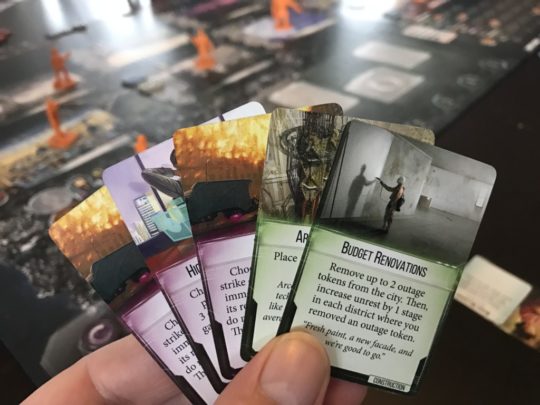
During the Counter Offer and Bidding phases, there is a negotiation… Future offers, payment to encourage/discourage bids etc which is great. I’m not usually a fan of negotiation but here I know what I want and I know the value of it so I feel more comfortable here.
You also have a personal goal to achieve each round for a nice financial bonus. This gives you that further reason to maybe not do what’s best for the game and to be a little selfish. Like the personal goals in Dead of Winter, you get 3 different ones over the game.
New Angeles Negatives
The icons on each part of the board, along with the 3 different minis that affect it can be confusing.
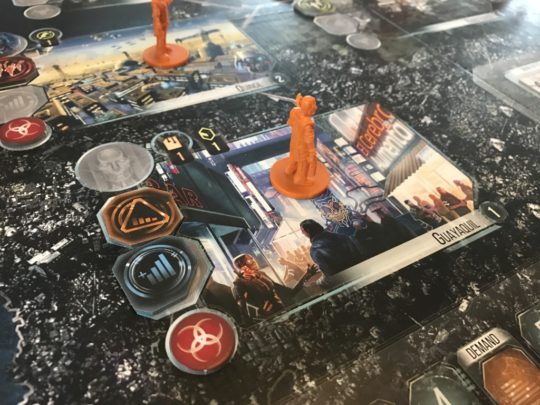
It really easy to see what’s there, although I could have used a different colour for one of the types of plastic units. I actually took a picture of the rule book so I had a chart of what effects each token and unit so I could refer to it.
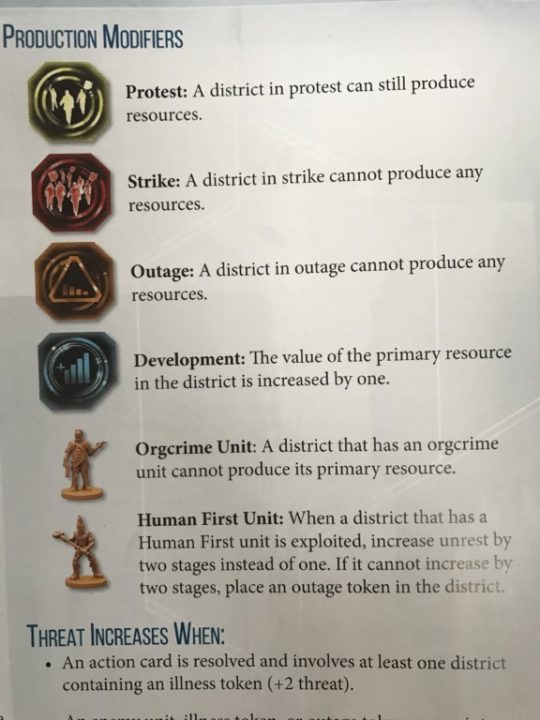
Deals made during negotiations aren’t binding which I don’t like, so I always get payment up front 😉 Once someone pays you, they can’t take it back.
New Angeles Summary
Co-op games, where you have to play together but you can’t/shouldn’t help ANYONE are great. “I would love to listen to you but how do I know you’re not trying to tank the game? “. “I’ll have to think about paying you 2 money so you bid for my card…” (because that puts you ahead of me on the track and I secretly need to beat you :))
Wasn’t expecting much going in but I really enjoyed it.
Jesta ThaRogue
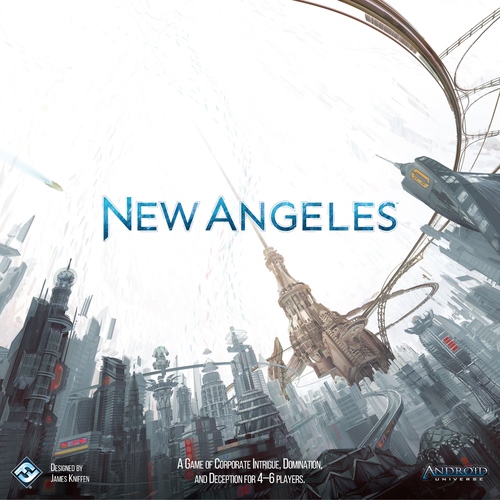


Leave a Reply